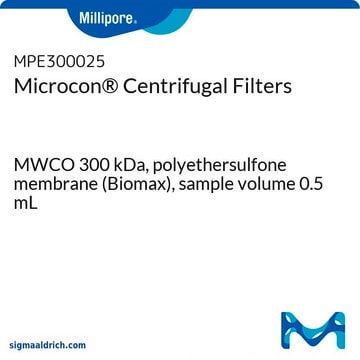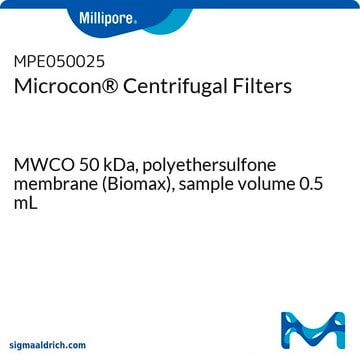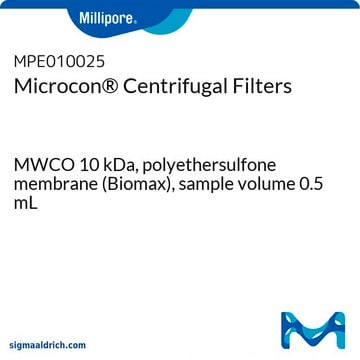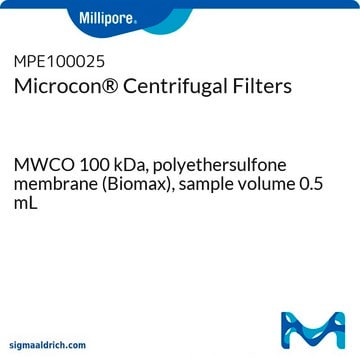Yes, a Microcon DNA fast flow device can be used to isolate DNA from a crude cell lysis preparation. However, lysates typically contain heavy particulate contamination, so clarification spins may be necessary to remove particulates before attempting ultrafiltration.
MRCF0R100
Filtres à centrifuger Microcon® DNA Fast Flow
sample volume 0.5 mL, Ultracel® regenerated cellulose membrane (low binding)
Synonyme(s) :
Centrifuge concentrator
About This Item
Produits recommandés
Matériaux
Ultracel® regenerated cellulose membrane (low binding)
polyacetal base (membrane support)
polycarbonate device top
polypropylene tube (for filtrate/concentrate)
silicone O-ring (medical-grade)
Niveau de qualité
Stérilité
non-sterile
Caractéristiques
holdup volume> 10 μL
Conditionnement
pkg of 100 ea
Fabricant/nom de marque
Microcon®
Paramètres
0.5 mL sample volume
Technique(s)
DNA purification: suitable
RNA purification: suitable
Longueur
4.50 cm (1.8 in.)
Diamètre
12.3 mm
Surface de filtration
0.32 cm2
Volume de travail
0.5 mL
Conditions d'expédition
ambient
Catégories apparentées
Description générale
Application
Caractéristiques et avantages
- très bonne récupération des échantillons de petit volume grâce à la centrifugation inverse
- membrane Ultracel® à faible adsorption
- traitement rapide
- facteurs de concentration inférieurs à 20 × pour des résultats reproductibles
Liaison
Informations légales
Certificats d'analyse (COA)
Recherchez un Certificats d'analyse (COA) en saisissant le numéro de lot du produit. Les numéros de lot figurent sur l'étiquette du produit après les mots "Lot" ou "Batch".
Déjà en possession de ce produit ?
Retrouvez la documentation relative aux produits que vous avez récemment achetés dans la Bibliothèque de documents.
Contenu apparenté
Microcon® Centrifugal Filters simply and efficiently concentrate and desalt solutions of DNA, RNA, protein or other macromolecules, using any centrifuge that can accept 1.5 mL tubes.
-
Can I use a Microcon DNA fast flow device to isolate DNA from a crude cell lysis preparation such a freeze thaw in TE buffer or a chelex 100 extraction?
1 answer-
Helpful?
-
-
The user guide indicates you can't autoclave these microcon, but can you sterilize them in a UV Crosslinker?
1 answer-
The Microcon devices are non-sterile. These devices cannot be sterilized by UV or autoclaving. However, it is possible to sanitize the devices with 70% ethanol. Please see the protocol for sanitization below:
1. Reagent Preparation: 70% Ethanol solution (v/v) is prepared by dilution in distilled water. Both the ethanol solution and distilled water used for rinsing should be filter-sterilized using sterile, 0.22 µm sterilizing grade filter device.
2.Sanitization Protocol:
A. Fill the Microcon device to its published capacity with filter-sterilized 70% ethanol, and cap the unit (note that the collection tubes can be sanitized in the same manner).
B. Invert device by hand or in an end-over-end mixer to continuously wet all internal surfaces of the device.
C. Incubate for a minimum of 5 minutes (note that the device can be capped and left for up to 24 hours if it is not going to be used immediately).
D. Spin at recommended G-force using appropriate centrifuge until at least 50% of the volume has passed through the device.
E. Aseptically discard any remaining ethanol from the filter device and filter collection tube.
F. Immediately rinse away residual ethanol by adding the filter-sterilized water to the device's published capacity, mix gently to wet all areas, and centrifuge until at least 50% of the volume has passed through the device.
G. Discard any remaining liquid from both the concentrator device and filter collection tube before use.
DO NOT let the filter membrane dry out in concentrator unit. If the devices are not to be used immediately, fill the devices with filter-sterilized distilled water, cover, and store refrigerated. Remove liquid from device as previously described prior to use.
Helpful?
-
-
Has the color of the Microcon DNA Fast Flow become brighter blue?
1 answer-
Yes, the color of the device has changed. A new blue colorant and clear resin have replaced the original blue reservoir resin, which has been discontinued. Both old and new resin are HP2 Polycarbonate. The functionality of the product has not changed.
Helpful?
-
Active Filters
Notre équipe de scientifiques dispose d'une expérience dans tous les secteurs de la recherche, notamment en sciences de la vie, science des matériaux, synthèse chimique, chromatographie, analyse et dans de nombreux autres domaines..
Contacter notre Service technique






